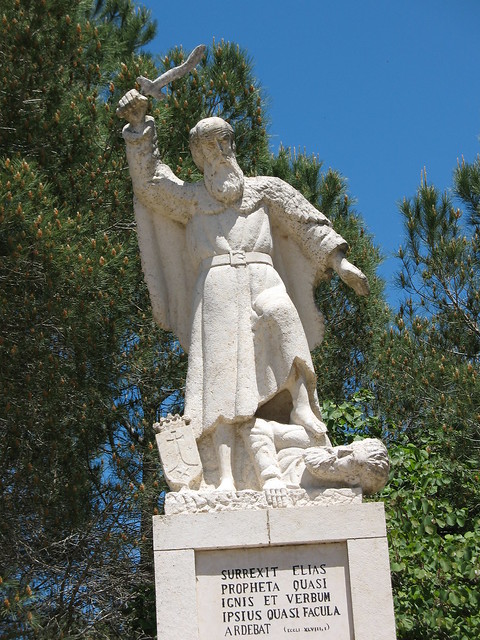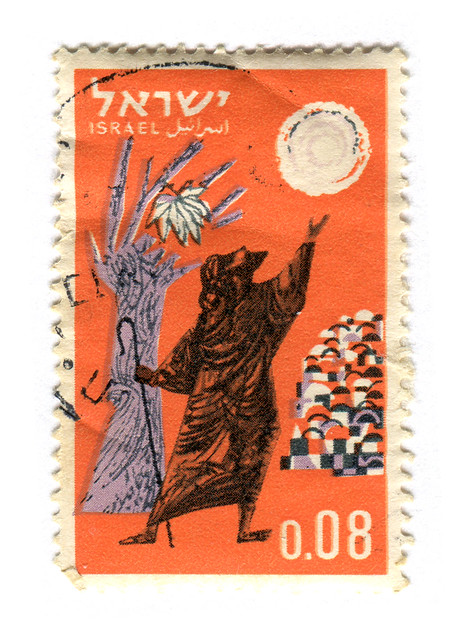Some passages are paraphrased to tell the story in the time allotted. They have the verses in (parentheses) instead of the 2verse numbers in the 3text.
1 Kings 18:41-46, 19:1-9
41Then Elijah told Ahab, “Get up, eat, and drink. It sounds like a heavy rain is coming.” 42Ahab got up to eat and drink. Elijah went to the top of Carmel and bowed down on the ground to pray. 43He said to his servant, “Please go back to Mount Carmel, and look toward the sea.” He went up, looked, came back, and said, “There’s nothing.” Seven times Elijah told him, “Go back.” 44After the seventh time the servant said, “A little cloud like a man’s hand is coming from the sea.” Elijah said, “Go and tell Ahab, ‘Prepare your chariot, and leave before the rain delays you.’ ” 45Gradually, the sky grew darker with clouds and wind, and there was a heavy rain. Ahab got into his chariot to go back to Jezreel. 46The Lord’s power was on Elijah. He hiked up his robe and ran ahead of Ahab until they came to Jezreel.
1Ahab told Jezebel everything Elijah had done, including how he had executed all the prophets. 2Then Jezebel sent a messenger to Elijah. She said, “May the gods strike me dead if by this time tomorrow I don’t take your life the way you took the lives of Baal’s prophets.” 3Frightened, Elijah fled to save his life. He came to Beersheba in Judah and left his servant there. 4Then he traveled through the wilderness for a day. He sat down under a broom plant and wanted to die. “I’ve had enough now, Lord,” he said. “Take my life! I’m no better than my ancestors.” 5Then he lay down and slept under the broom plant.
 |
| Elijah fed by an angel Tintoretto |
An angel touched him and said, “Get up and eat.” 6When he looked, he saw near his head some bread baked on hot stones and a jar of water. So he ate, drank, and went to sleep again. 7The angel of the Lord came back and woke him up again. The angel said, “Get up and eat, or your journey will be too much for you.” 8He got up, ate, and drank. Strengthened by that food, he traveled for 40 days and nights until he came to Horeb, the mountain of God. 9There he went into a cave and spent the night.
1) Does it make sense for Elijah to be afraid? He just smote 450 or 850 enemy priests and ran like a superhero…
2) Horeb is (probably) another name for Sinai, where Moses received the 10 commandments, spending 40 days in a cloud with the Lord. What’s the significance of that?
3) Why was Elijah ready to die? Have you ever felt really down not too long after a great experience?
1 Kings 19:9-18
Then the Lord spoke his word to Elijah. He asked, “What are you doing here, Elijah?” 10He answered, “Lord God of Armies, I have eagerly served you. The Israelites have abandoned your promises, torn down your altars, and executed your prophets. I’m the only one left, and they’re trying to take my life.” 11God said, “Go out and stand in front of the Lord on the mountain.”
As the Lord was passing by, a fierce wind tore mountains and shattered rocks ahead of the Lord. But the Lord was not in the wind. After the wind came an earthquake. But the Lord wasn’t in the earthquake. 12After the earthquake there was a fire. But the Lord wasn’t in the fire. And after the fire there was a quiet, whispering voice. 13When Elijah heard it, he wrapped his face in his coat, went out, and stood at the entrance of the cave.
Then the voice said to him, “What are you doing here, Elijah?” 14He answered, “Lord God of Armies, I have eagerly served you. The Israelites have abandoned your promises, torn down your altars, and executed your prophets. I’m the only one left, and they’re trying to take my life.” 15The Lord told him, “Go back to the wilderness near Damascus, the same way you came.”
(15-18) Then the Lord gave specific instructions as to whom Elijah should anoint as king, told him Elisha was to follow him as prophet, and assured him that there were still “7,000 people in Israel whose knees have not knelt to worship Baal.”
4) People LOVE this story. Why do you think?
3 Dramatic Stories. Split the students up into groups to perform them dramatically.
1 Kings 21:1-29
 |
| Jezebel as imagined by Thomas Hawk @Flickr |
(1-14) Ahab told his neighbor, “give me your vineyard.” He said he’d pay for it or get him another, but he wanted it for a vegetable garden. The neighbor said that God told him not to give him the vineyard of his ancestors, and Ahab got very resentful. Jezebel noticed and asked why, and said not to worry, she’d get it for him. Jezebel wrote letter in Ahab’s name and told the leaders of Naboth’s city to pretend to honor Naboth and then accuse him of cursing God and king. These men in Naboth’s city did what Jezebel asked them to do and wrote her that “Naboth has been stoned to death.” 15Jezebel received the message and said to Ahab, “Get up! Confiscate the vineyard which Naboth from Jezreel refused to sell you. He’s dead now.” 16When he heard about Naboth’s death, Ahab went to confiscate the vineyard.
17Then the Lord spoke his word to Elijah from Tishbe: 18“Go, meet King Ahab of Israel, who lives in Samaria. He went to confiscate Naboth’s vineyard. 19Tell him, ‘This is what the Lord asks: Have you murdered someone just to confiscate a vineyard?’ Then tell him, ‘This is what the Lord says: At the place where the dogs licked up Naboth’s blood, the dogs will lick up your blood.’ ” 20Ahab asked Elijah, “So you’ve found me, my enemy?” Elijah answered, “I found you. Because you sold yourself to do what the Lord considers evil. 21So I am going to bring evil on you. I will destroy your descendants. I will destroy every male[a] in Ahab’s house, whether slave or freeman in Israel. … You led Israel to sin.” 23Then the Lord also spoke through Elijah about Jezebel: “The dogs will eat Jezebel inside the walls of Jezreel. 24If anyone from Ahab’s house dies in the city, dogs will eat him. If anyone dies in the country, birds will eat him.” …
27When Ahab heard these things, he tore his clothes in distress and dressed in sackcloth. He fasted, lay in sackcloth, and walked around depressed. 28Then the Lord spoke his word to Elijah from Tishbe: 29“Do you see how Ahab is humbling himself in my presence? Because he’s humbling himself in my presence, I will not let any evil happen to his family while he is alive. I will bring evil on it during his son’s lifetime.”
2 Kings 1:1-16
1After Ahab died, Moab rebelled against Israel. 2During the rebellion King Ahaziah fell through a window lattice in his upstairs room in Samaria and injured himself.
(3-9) So Ahaziah sent messengers to ask Baalzebub whether he would get better. Elijah met the messengers and told them to go back to the king and tell him he was going to die where he lay. The king recognized Elijah from their description, and Ahaziah sent an officer with 50 soldiers to fetch Elijah. The officer commanded Elijah to come. 10Elijah answered the officer, “If I’m a man of God, fire will come from heaven and burn up you and your 50 men.” Then fire came from heaven and burned up the officer and his 50 men.
(11-16) The king sent another 50 and this happened again. The king sent another 50 and this commander asked Elijah for mercy. God told Elijah to go with him, and then Elijah told the king directly 16“You sent messengers to seek advice from Baalzebub, the god of Ekron. Is this because you think there is no God in Israel whose word you can seek? You will not get up from the bed you are lying on. Instead, you will die there.” Joram, Ahab’s grandson, was the next king
But what happened to Jezebel?
2 Kings 9:30-36 (After Elisha anoints Jehu king of Israel, and God commands him to kill Ahab’s grandson Joram.)
30When Jehu arrived in Jezreel, Jezebel heard about it. She put on eye shadow, fixed her hair, and looked out of a second-story window. 31When Jehu entered the gateway, she asked, “Is everything alright, Zimri, murderer of your master?”
32Looking up at the window, he asked, “Is anyone on my side? Anyone?” Then two or three eunuchs looked out at him. 33He said, “Throw her down.” They threw her down, and some of her blood splattered on the wall and the horses. The horses trampled her.
34He went inside, ate, and drank. Then he said, “Take care of this woman who had a curse on her. After all, she was a king’s daughter.” 35But when they went out to bury her, they couldn’t find any of her body except her skull, feet, and hands. 36They came back and told him.




